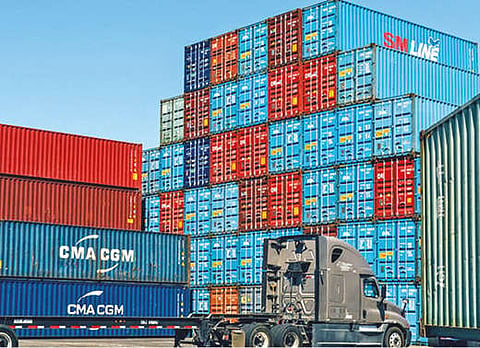

By: J SMIALEK, A SWANSON
For the past three decades, companies and consumers benefited from cross-border connections that kept a steady supply of electronics, clothes, toys and other goods so abundant it helped prices stay low. But as the pandemic and the war in Ukraine continue to weigh on trade and business ties, that period of plenty appears to be undergoing a partial reversal. Companies are rethinking where to source their products and stocking up on inventory, even if that means lower efficiency and higher costs. If it lasts, such a shift away from fine-tuned globalisation could have important implications for inflation and the world’s economy.
Economists are debating whether recent supply chain turmoil and geopolitical conflicts will result in a reversal or reconfiguration of global production, in which factories that were sent offshore move back to the United States and other countries that pose less of a political risk.
If that happens, a decades-long decline in the prices of many goods could come to an end or even begin to go in the other direction, potentially boosting overall inflation. Since around 1995, durable goods like cars and equipment have tamped down inflation, and prices for non-durable goods like clothing and toys have often grown only slowly. Those trends began to change in late 2020 after the onset of the pandemic, as shipping costs soared and shortages collided with strong demand to push car, furniture and equipment prices higher. While few economists expect the past year’s breakneck price increases to continue, the question is whether the trend toward at least slightly pricier goods will last.
The answer could hinge on whether a shift away from globalisation takes hold. “It would certainly be a different world — it might be a world of perhaps higher inflation, perhaps lower productivity, but more resilient, more robust supply chains,” Jerome H. Powell, the Fed chair, said at an event last month when asked about a possible move away from globalisation.
Still, Powell said, it’s not obvious how drastically conditions will change. “It’s not clear that we’re seeing a reversal of globalisation,” he said. “It’s clear that it’s slowed down.” The period of global integration that prevailed before the pandemic made many of the things Americans buy cheaper. Computers and other technology made factories more efficient, and they chugged out sneakers, kitchen tables and electronics at a pace unmatched in history. Companies slashed their production cost by moving factories offshore, where wages were lower. The adoption of steel shipping containers, and ever larger cargo ships, allowed products to be whisked from Bangladesh and China to Seattle and Tupelo and everywhere in between for astonishingly low prices.
But those changes also had consequences for American factory workers, who saw many jobs disappear. The political backlash to globalisation helped carry former President Donald J. Trump into office, as he promised to bring factories back to the United States. His trade wars and rising tariffs encouraged some companies to move operations out of China, although typically to other low-cost countries like Vietnam and Mexico.
The pandemic also exposed the snowball effect of highly optimised supply chains: Factory shutdowns and transportation delays made it difficult to secure some goods and parts, including semiconductors that are crucial for electronics, appliances and cars. Shipping costs have soared by a factor of 10 in just two years, erasing the cost savings of making some products overseas.
Visit news.dtnext.in to explore our interactive epaper!
Download the DT Next app for more exciting features!
Click here for iOS
Click here for Android